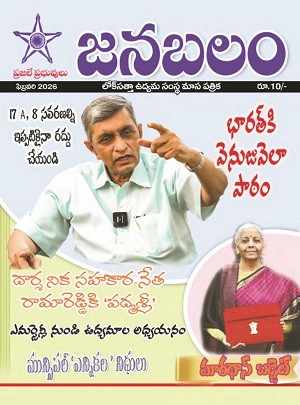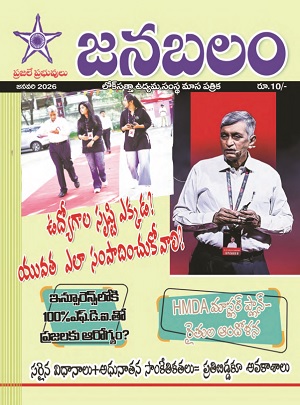Subscribe to:
Post Comments (Atom)
skip to main |
skip to sidebar
Followers
Search This Blog
Blog Archive
-
▼
2015
(619)
-
▼
May
(55)
- లోక్ సత్తా గ్రేటర్ ప్రధాన కార్యదర్శిగా సాంబిరెడ్డి
- ప్రజల్ని మద్యానికి బలి చేస్తారా?: లోక్ సత్తా
- ఫ్యూచర్ స్కోప్ ఎడ్యుకేషన్ ఫెయిర్ ప్రారంభం
- హైటెక్స్ లో ఫ్యూచర్ స్కోప్ ఎడ్యుకేషనల్ ఎక్స్ పో
- యువత నైపుణ్యాలను మెరుగుపరచుకోవాలి: జేపీ
- లోక్ సత్తా గ్రేటర్ ప్రధాన కార్యదర్శిగా సాంబిరెడ్డి
- విద్యావ్యవస్థలో మార్పులు రావాలి: జేపీ
- మళ్లీ అశాంతిని రాజేయవద్దు
- లోక్ సత్తా పార్టీ గ్రేటర్ హైదరాబాద్ అధ్యక్షుడిగా త...
- గొప్ప నైపుణ్యం, తపన ఉన్న ప్రజాసేవకుడ్ని కోల్పోయాం ...
- ఇదేనా స్వచ్ఛ హైదరాబాద్ అంటే?
- 'స్వచ్ఛ హైదరాబాద్' ప్రచారార్భాటమే: లోక్ సత్తా
- 'స్వచ్ఛ' హైదరాబాద్ ప్రచారమే: లోక్ సత్తా
- లోక్ పాల్ - లోకాయుక్తలు, లోక్ సభ, అసెంబ్లీ లకు జమి...
- నగర వీధుల్లో పోస్టర్లు, బ్యానర్లు తొలగించాలన్న నిర...
- ఓయూ భూముల జోలికి వస్తే ఊరుకోం
- ఓయూ భూముల జోలికొస్తే ఆందోళనలు తప్పవు: లోక్ సత్తా
- సీఎం కేసీఆర్ ఆలోచనను తక్షణమే విరమించుకోవాలి
- కఠినంగా మద్యం నియంత్రణ
- ప్రభుత్వమే మద్యం విక్రయించాలి: భీశెట్టి
- ప్రభుత్వమే మద్యం విక్రయించాలి
- ఆడలేక మద్దెల ఓడు తరహాలో వ్యవహరిస్తున్న ఆప్ ప్రభుత్...
- Dr.JP Rates First Year Of Modi Government; On AAP ...
- ఉస్మానియా వర్సిటీ స్థలాల జోలికొస్తే సహించం: లోక్ స...
- పార్టీ బలోపేతానికి కృషి
- గుర్తించిన నియోజకవర్గాల్లో విస్తృతంగా కార్యకలాపాలు
- మద్యం అమ్మకాలు ప్రభుత్వమే చేపట్టాలి
- Sec. 17(A) will weaken CBI, ACB, says JP
- Implications of the Proposed Section 17A in Preven...
- లోక్ పాల్ చట్టాన్ని, అవినీతిపై పోరుని నీరుగార్చే '...
- విశ్వసనీయతను తగ్గించుకునేలా సుప్రీంకోర్టు వ్యవహరిం...
- Build Kalabharathi elsewhere: LS to KCR
- JP urges KCR to spare NTR Stadium, Indira Park
- ప్రతిష్ఠకు పోకుండా ఎన్టీఆర్ స్టేడియంను, ఇందిరా పార...
- ఎన్టీఆర్ స్టేడియంలో 'కళాభారతి' వద్దు
- కళాభారతి వద్దని రమణాచారికి వినతి
- కళాభారతి నిర్మాణంపై ప్రజాభిప్రాయ సేకరణ
- Acquittal of Jayalalitha Shows the Complexity of R...
- సంస్కరణలు లేకుంటే భవిష్యత్తు భారతాన్ని కాపాడుకోలేం...
- లోక్ సత్తా గ్రేటర్ హైదరాబాద్ ఆధ్వర్యంలో మిస్డ్ కాల...
- 'లోక్ సత్తా' ఉద్యమానికి మంచి స్పందన
- గ్రేటర్ ఎన్నికల్లో విజయఢంకా మోగించాలి
- తాత్కాలిక తాయిలాల వినాశకర రాజకీయానికి సరైన సమాధానం...
- మిస్డ్ కాల్ ఉద్యమం
- నిర్మాణాలు వ్యతిరేకిస్తూ మిస్డ్ కాల్ ఉద్యమం: లోక్ ...
- 6న బెంగళూరులో జేపీ పర్యటన
- Cong, JP Bat for NTR Stadium
- శుంఠల్లారా.. తెలుసుకోండి
- ఇందిరపార్కు పచ్చదనాన్ని హరించవద్దంటూ జేపీ ర్యాలీ
- 'కళాభారతి' పై న్యాయపోరాటం
- అభివృద్ధి పేరుతో నగర నాశనం వద్దు
- సంతకాల సేకరణకు స్పందన
- లోక్ సత్తా సంతకాల సేకరణ
- లోక్ సత్తా పార్టీ తెలంగాణా రాష్ట్ర అధ్యక్షుడిగా డా...
- New President, General Secretary and Treasurer for...
-
▼
May
(55)






Politics Holds Key to Combat Corruption
ReplyDeleteET editorial
The Karnataka High Court verdict setting aside former and soon-to-be Tamil Nadu chief minister J Jayalalithaa's conviction by a trial court is good advertisement for her lawyers, but poor publicity for India's legal system. The court has gone by the fundamental principle that the burden of proving crime beyond doubt rests on the prosecution. It is not the responsibility of the accused to prove his or her innocence. So long as the accused can raise reasonable doubt about the veracity of the prosecution's claims, they are entitled to the benefit of the doubt. Which is what Jayalalithaa has benefited from.
The prosecution, finds the court, has, in the present case, made the fundamental mistake of not taking into account loans obtained by the accused to finance acquisition of the assets that are deemed excessive, besides resting on assumptions and estimations as to the costs incurred by the accused. Jayalalithaa's defence derives considerable strength from the fact that she had filed income-tax returns, even if belatedly , and these had been settled, even if after compounding. It is, however, telling that the Tamil Nadu political leader's defence argued that gifts of gold and silver to political leaders are not illegal.
The prolonged prosecution, relating to her term as chief minister over 1991-96, and its eventual failure serve to show, besides procedural inefficiency , the futility of seeking purely legal remedies to corruption. In India, the roots of corruption lie in how politics is financed. Unless political funding gets institutionalised and political expenditure routinely audited on a real-time basis, corruption cannot be rooted out. Shortcomings in democratic politics have to be made good in the realm of politics itself. This is hard work, no doubt, but there is no route to better politics outside politics.